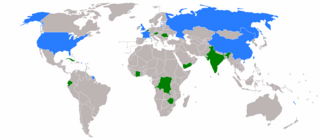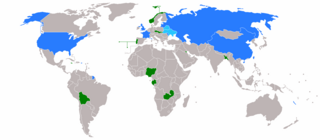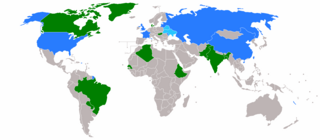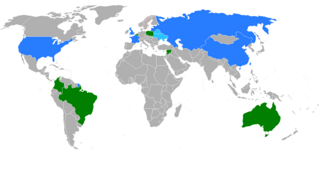
The 2006 United Nations Security Council election began on 16 October 2006 during the 61st session of the United Nations General Assembly, held at United Nations Headquarters in New York City. The elections were for five non-permanent seats on the Security Council for two-year mandates commencing on 1 January 2007.

The 2008 United Nations Security Council election was held on 17 October 2008 during the 63rd session of the United Nations General Assembly, held at United Nations Headquarters in New York City. The elections were held for five non-permanent seats on the UN Security Council for two-year mandates commencing on 1 January 2009.
The 2011 International Court of Justice election began on 10 November 2011 at United Nations Headquarters in New York City. In the set of triennial elections, the General Assembly and the Security Council concurrently elect five judges to the Court for nine-year terms, in this case beginning on 6 February 2012. From the eight candidates, the five winners were Giorgio Gaja (Italy), Hisashi Owada (Japan), Peter Tomka (Slovakia), Xue Hanqin (China) and Julia Sebutinde (Uganda).

The 1990 United Nations Security Council election was held on 1 November 1990 during the Forty-fifth session of the United Nations General Assembly, held at United Nations Headquarters in New York City. The General Assembly elected Austria, Belgium, Ecuador, India, and Zimbabwe, as the five new non-permanent members of the UN Security Council for two-year mandates commencing on 1 January 1991.

The 1976 United Nations Security Council election was held on 21 October 1976 during the Thirty-first session of the United Nations General Assembly, held at United Nations Headquarters in New York City. The General Assembly elected Canada, the Federal Republic of Germany, India, Mauritius, and Venezuela, as the five new non-permanent members of the UN Security Council for two-year mandates commencing on 1 January 1977. Both Mauritius and West Germany were elected members of the council for the first time.

The 1984 United Nations Security Council election was held from 22 October to 18 December 1984 during the Thirty-ninth session of the United Nations General Assembly, held at United Nations Headquarters in New York City. The General Assembly elected Australia, Denmark, Madagascar, Thailand, and Trinidad and Tobago, as the five new non-permanent members of the UN Security Council for two-year mandates commencing on 1 January 1985. Madagascar, Thailand and Trinidad and Tobago were elected to Council for the first time.

The 1983 United Nations Security Council election was held on 31 October 1983 during the Thirty-eighth session of the United Nations General Assembly, held at United Nations Headquarters in New York City. The General Assembly elected Egypt, India, Peru, the Ukrainian SSR, and Upper Volta, as the five new non-permanent members of the UN Security Council for two-year mandates commencing on 1 January 1984.

The 1981 United Nations Security Council election was held on 15 October 1981 during the Thirty-sixth session of the United Nations General Assembly, held at United Nations Headquarters in New York City. The General Assembly elected Guyana, Jordan, Poland, Togo, and Zaire, as the five new non-permanent members of the UN Security Council for two-year mandates commencing on 1 January 1982. Togo and Zaire were elected for the first time.

The 1980 United Nations Security Council election was held from 20 October to 13 November 1980 during the Thirty-seventh session of the United Nations General Assembly, held at United Nations Headquarters in New York City. The General Assembly elected Ireland, Japan, Panama, Spain, and Uganda, as the five new non-permanent members of the UN Security Council for two-year mandates commencing on 1 January 1981.

The 1978 United Nations Security Council election was held on 10 November 1978 during the Thirty-third session of the United Nations General Assembly, held at United Nations Headquarters in New York City. The General Assembly elected Bangladesh, Jamaica, Norway, Portugal, and Zambia, as the five new non-permanent members of the UN Security Council for two-year mandates commencing on 1 January 1979. Notably, Bangladesh, Jamaica and Portugal were elected members of the council for the first time.

The 1977 United Nations Security Council election was held on 24 October 1977 during the Thirty-second session of the United Nations General Assembly, held at United Nations Headquarters in New York City. The General Assembly elected Bolivia, Czechoslovakia, Gabon, Kuwait, and Nigeria, as the five new non-permanent members of the UN Security Council for two-year mandates commencing on 1 January 1978. Gabon and Kuwait were elected to the Council for the first time.

The 1975 United Nations Security Council election was held on between 20 October and 23 October 1975 during the Thirtieth session of the United Nations General Assembly, held at United Nations Headquarters in New York City. The General Assembly elected Dahomey, Libya, Pakistan, Panama, and Romania, as the five new non-permanent members of the UN Security Council for two-year mandates commencing on 1 January 1976. Benin and Libya were elected for the first time.

The 1973 United Nations Security Council election was held on 15 October 1973 during the Twenty-eighth session of the United Nations General Assembly, held at United Nations Headquarters in New York City. The General Assembly elected the Byelorussian SSR, Cameroon, Costa Rica, Iraq, and Mauritania, as the five new non-permanent members of the UN Security Council for two-year mandates commencing on 1 January 1974. This was the first election of Cameroon, Costa Rica and Mauritania and the only election of Byelorussian SSR into the council.

The 1972 United Nations Security Council election was held on 20 October 1972 during the Twenty-seventh session of the United Nations General Assembly, held at United Nations Headquarters in New York City. The General Assembly elected Australia, Austria, Indonesia, Kenya, and Peru, as the five new non-permanent members of the UN Security Council for two-year mandates commencing on 1 January 1973. In addition, Austria, Indonesia and Kenya were elected into the council for the first time.

The 1971 United Nations Security Council election was held on 23 November 1971 during the Twenty-sixth session of the United Nations General Assembly, held at United Nations Headquarters in New York City. The General Assembly elected Guinea, India, Panama, Sudan, and Yugoslavia, as the five new non-permanent members of the UN Security Council for two-year mandates commencing on 1 January 1972. It was the first election of Guinea and Sudan into the council.

The 1969 United Nations Security Council election was held on 20 October 1969 during the Twenty-fourth session of the United Nations General Assembly, held at United Nations Headquarters in New York City. The General Assembly elected the Burundi, Nicaragua, Poland, Sierra Leone, and Syria, as the five new non-permanent members of the UN Security Council for two-year mandates commencing on 1 January 1970. It was the first time Burundi, Nicaragua and Sierra Leone were elected members of the council.

The 1967 United Nations Security Council election was held on 6 November 1967 during the Twenty-second session of the United Nations General Assembly, held at United Nations Headquarters in New York City. The General Assembly elected Algeria, Hungary, Pakistan, Paraguay, and Senegal, as the five new non-permanent members of the UN Security Council for two-year mandates commencing on 1 January 1968. Algeria and Senegal saw their first election into the council.

The second 1946 United Nations Security Council election was held on 19 November 1946 during the First session of the United Nations General Assembly. The General Assembly elected Belgium, Colombia, and Syria, as the three new non-permanent members of the UN Security Council for two-year mandates commencing in January 1947.

The 1965 United Nations Security Council election was held on 10 December 1965 during the twentieth session of the United Nations General Assembly, held at United Nations Headquarters in New York City. The General Assembly elected seven members, as non-permanent members of the UN Security Council for two-year mandates commencing on 1 January 1966.
The 1946 International Court of Justice election took place on 6 February 1946 in Westminster Central Hall, London. This was the first ever election of Judges of the Court, one the six "principal organs" of the newly created United Nations. All 15 seats were to be filled.

















